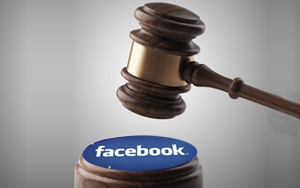Advocates Urge Court To Reconsider Facebook's $20 Million 'Sponsored Stories' Settlement
- by Wendy Davis @wendyndavis, January 21, 2016
 The University of San Diego's Children's Advocacy Institute is asking a federal appellate court to reconsider its recent decision upholding Facebook's $20 million "sponsored stories"
settlement.
The University of San Diego's Children's Advocacy Institute is asking a federal appellate court to reconsider its recent decision upholding Facebook's $20 million "sponsored stories"
settlement.
The watchdog, which is part of the law school's Center for Public Interest Law, says the settlement will empower Facebook to "capture, rearrange and republish" posts by children.
"It allows capture of their postings (including photos) by Facebook, editing, and republication to potentially large numbers of friends and strangers -- without prior consent or even notice to the child or parent," the group says in a motion for rehearing filed Wednesday with the 9th Circuit Court of Appeals.
The Children's Advocacy Institute, which is bringing the motion on behalf of a parent of two underage Facebook users, argues that the settlement will affect the privacy rights of more than 10 million U.S. teens.
The settlement, which was approved in 2013 by U.S. District Court Judge Richard Seeborg, resolved a class-action lawsuit alleging that Facebook's sponsored stories violates a California law about endorsements. That law says companies need adults' permission before using their names or images in ads. When minors' names or images are used in ads, companies must obtain parental consent. The measure provides for penalties of $750 per violation.
The deal requires Facebook to pay $15 each to around 600,000 users who were featured in “sponsored stories” -- ads featuring users' names and images and shown to their friends. Facebook also agreed to revise its terms of service to require that users give permission for their names and photos to be shown in ads. Users under 18 must represent that at least one parent agrees. (The company discontinued the “sponsored stories” program in 2014, but still allows people's names and photos to be paired with ads.)
The settlement's critics, including the Children's Advocacy Institute, argued to the 9th Circuit that the deal shouldn't have been approved. They raised a host of objections, including that the settlement would allow Facebook to violate laws in seven states, including California, that prohibit companies from using minors' names and photos in ads without their parents' consent.
A three-judge panel of the 9th Circuit rejected that argument on the grounds that it's unclear whether Facebook's ad program violated California's privacy law. The judges added that the settlement offers "more protection for minors from Facebook's advertising practices than existed before."
The Children's Advocacy Institute is now asking the 9th Circuit to rehear the case "en banc" -- which would involve a hearing in front of at least 11 of the court's judges.
The watchdog says that Facebook shouldn't be able to use minor's names and photos in ads merely by inserting a "blanket waiver" in its terms and conditions. The group says the case should be sent back to Seeborg, and that new counsel should be appointed just to represent minors who use Facebook.
"It is respectfully imperative that the panel decision be reheard," the watchdog argues. "The unprecedented consequences of allowing a commercial entity to limit privacy rights of millions of children through a contract most of those children (and their parents) will not see must not be taken lightly."


